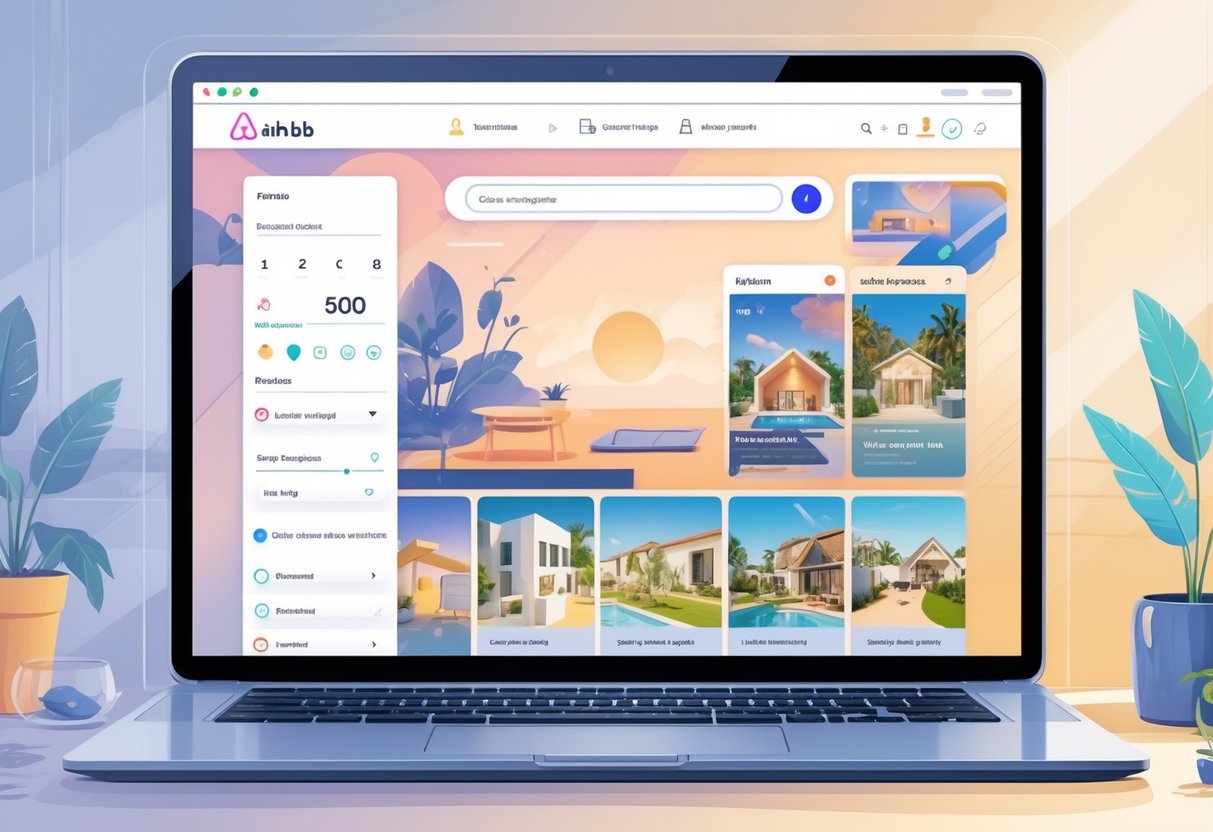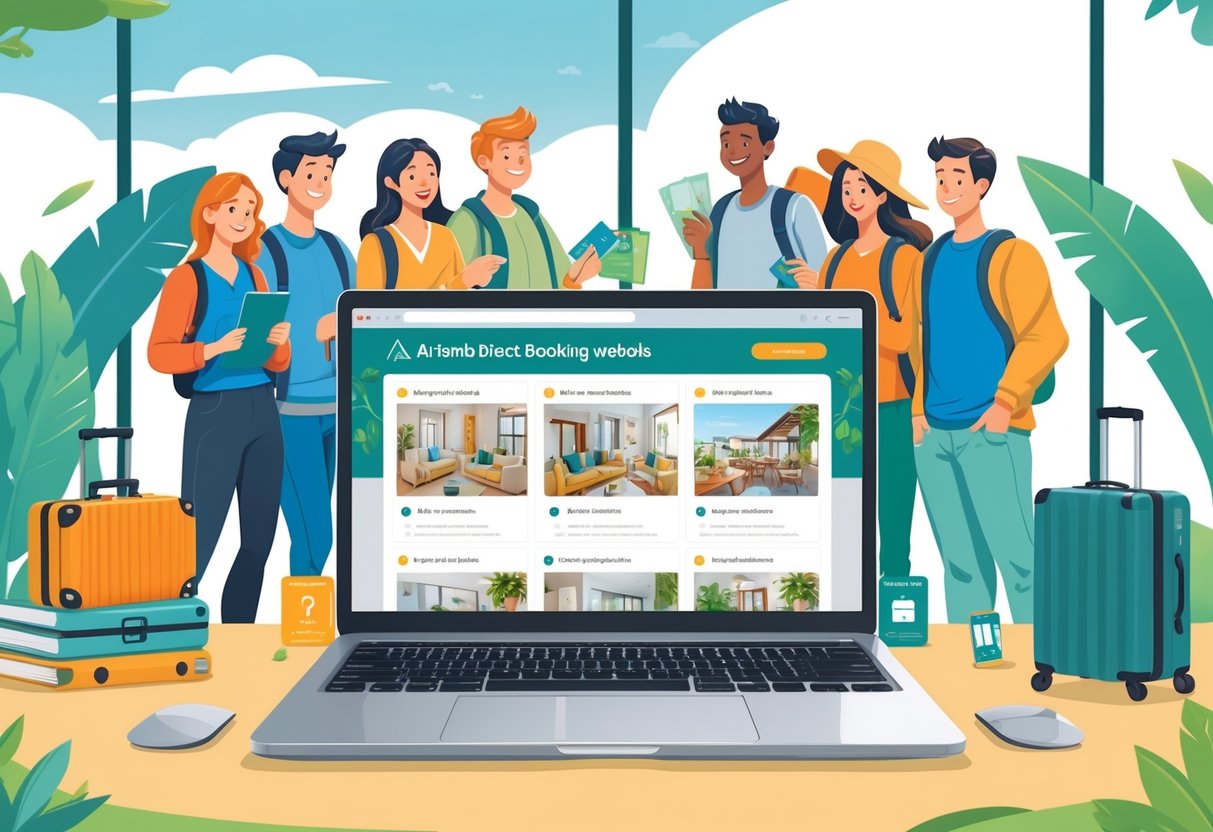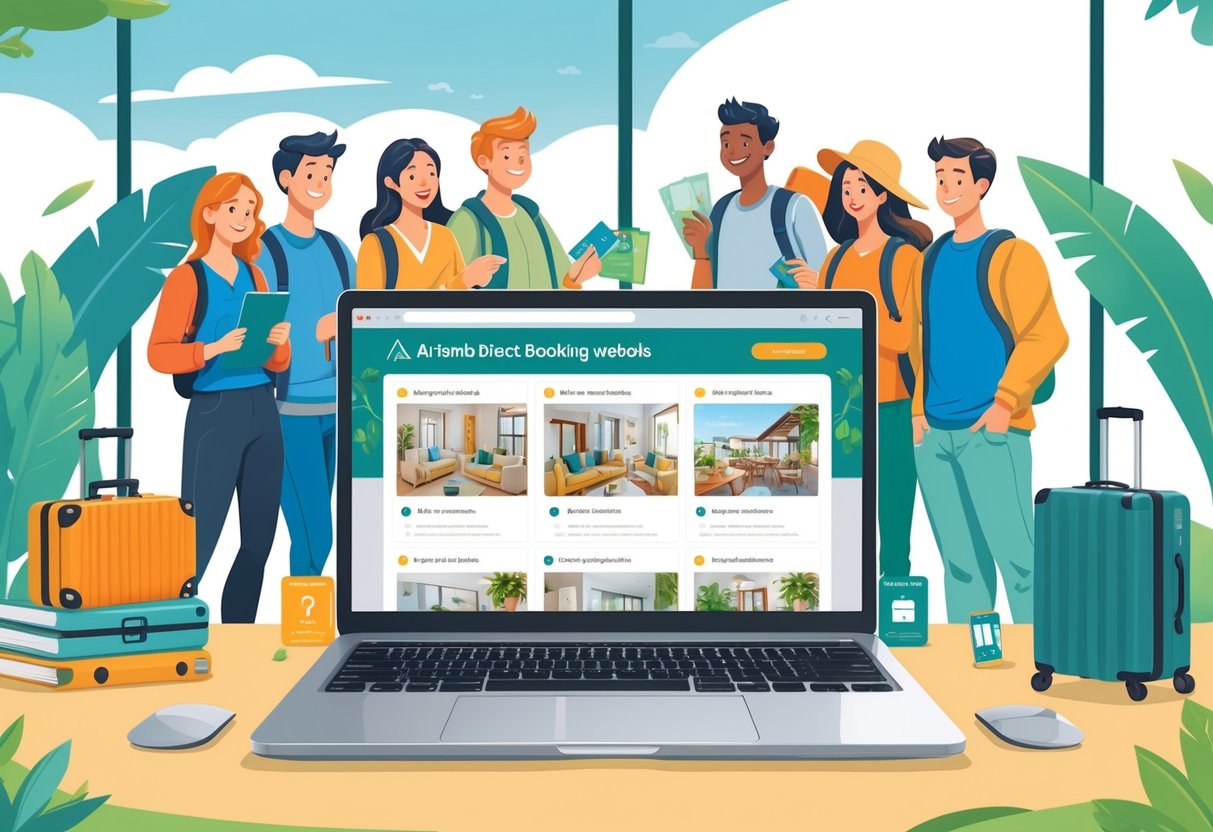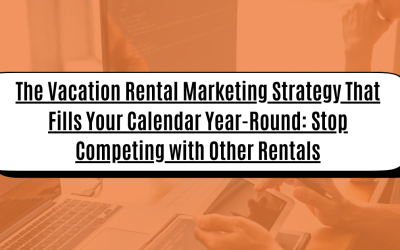A lot of Airbnb hosts ask themselves if they should set up a direct booking website to cut out platform fees and have more control over their rentals. A direct booking website lets vacation rental owners take reservations straight from guests, skipping the 3-15% commission Airbnb and other platforms charge.
This approach hands hosts total control over pricing, guest communication, and branding. You keep more profit from every reservation.

Building a direct booking website is honestly easier than it’s ever been. Specialized vacation rental software and website builders now exist just for short-term rentals.
These tools handle payment processing and calendar sync across all your booking channels. Direct bookings mean no more booking fees and a lot more independence from third-party platforms.
To make a direct booking website work, you’ll need to pick the right platform, add must-have features like booking engines and payment systems, and actually get people to visit your site. Keeping your Airbnb and other platform listings up is still smart for visibility, but your own website becomes a backup income stream and a way to build loyal, repeat guests.
Key Takeaways
- Direct booking websites cut out platform commission fees and put hosts in the driver’s seat.
- Specialized vacation rental website builders make it pretty painless to launch a site with payment and calendar tools.
- You need solid marketing alongside your site to lure guests away from the big platforms.
What Is an Airbnb Direct Booking Website?

A direct booking website lets property owners accept reservations without relying on platforms like Airbnb. You get full control over pricing, policies, and guest relationships.
These sites usually come with booking engines, payment processing, and property management tools that make reservations easier.
Definition and Core Features
An Airbnb direct booking website is a custom site where guests book your property directly. No Airbnb or Vrbo needed.
It has a booking engine, payment processing, and property details. You control pricing, policies, and branding.
Must-Have Features:
- Real-time availability calendar
- Secure payment processing
- Property photos and descriptions
- Guest review system
- Mobile-friendly design
The booking engine takes reservation requests automatically. Guests check availability, pick their dates, and pay right away.
Payment processing connects with services like PayPal or Stripe. Hosts can take deposits, full payments, or even installments.
Most direct booking websites sync with channel managers so your calendar stays up-to-date everywhere. Double bookings? Not really an issue if you set this up right.
Direct Booking vs. Airbnb Platform
Direct booking websites run independently from Airbnb’s ecosystem. Property owners manage how their listing looks, set their own pricing, and handle guest communication as they please.
Quick Comparison:
| Direct Booking | Airbnb Platform |
|---|---|
| 0% booking fees | 3-15% platform fees |
| Custom policies | Platform rules required |
| Direct guest contact | Limited communication |
| Full pricing control | Algorithm influences visibility |
Airbnb takes a 3% to 5% service fee from hosts for each booking. Guests get hit with even more fees—sometimes up to 14% of the booking total.
Direct booking sites cut out those platform fees. Hosts can lower prices by 5-15% or just pocket the extra money. It’s a competitive edge for both sides.
Communication is just different. Airbnb blocks you from sharing contact info until after a booking is confirmed. On your own site, you can talk to guests by phone or email right away.
The Role of Direct Bookings in STR Success
Direct bookings bring in more revenue per reservation than platform bookings. The average direct booking is $1,935, while it’s $906 on Airbnb.
Revenue Perks:
- You can charge higher nightly rates
- Stays are often longer
- Less dependence on platforms
- More repeat bookings
Direct bookings average 5.9 nights, compared to 4.5 on Airbnb and Vrbo. Longer stays mean fewer turnovers and less cleaning.
STR businesses use direct booking sites to spread out their marketing. If Airbnb suddenly changes a policy or its algorithm, you’re not totally sunk.
Repeat guests are more likely to book directly. Building those relationships pays off in loyalty and future bookings.
With your own site, you can show off your personality and local knowledge. Airbnb’s template doesn’t give you much room for that.
Benefits of Building a Direct Booking Website for Airbnb Hosts

Building a direct booking website means you keep more money and get to know your guests better. Hosts own the guest data and can actually build a recognizable brand that brings people back.
Increase Profitability and Eliminate Platform Fees
Direct bookings ditch the expensive fees from OTAs and platforms. Airbnb typically takes 3-15% in service fees, and guests pay even more.
If you make $50,000 a year through Airbnb, you’re paying $2,500-$7,500 in platform fees. With direct bookings, you keep that.
Fee Breakdown:
- Platform booking: Host pays 3-15%, guest pays 14-16%
- Direct booking: No platform fees
Hosts can offer 10-15% lower prices and still earn more. That’s a win-win—guests save, you profit.
Payment processors like Stripe or PayPal only take 2.9% plus 30 cents per transaction. That’s way less than what Airbnb or Vrbo grabs.
Full Control of Guest Experience and Data
Direct booking websites put you in charge of all guest data and how you talk to people. Platforms keep guest info private and limit direct communication.
Hosts collect:
- Email addresses for follow-up and marketing
- Booking preferences and requests
- Stay history and spending habits
- Demographics for better targeting
With this, you can personalize stays and run targeted marketing. Send special offers, local tips, or promotions straight to past guests.
You communicate directly—no platform middleman. That means you can send detailed check-in info, local recommendations, or whatever you want.
Calendar management is also yours. Set your own cancellation policies, minimum stays, and pricing.
Strengthen Brand Identity and Trust
Having your own website makes you look professional—like you really mean business. Building trust with branding takes more than just a nice logo, but it helps.
What Builds Trust:
- Consistent logo and colors
- Secure payment options
- Guest reviews and testimonials
- Clear refund and cancellation policies
Guests remember your property by name, not just as “that Airbnb.” That means more direct traffic and less reliance on platform searches.
Using a custom email (like info@propertyname.com) looks more legit. Social media linked to your site gives guests more ways to find and trust you.
Optimizing for local SEO puts you in Google searches for your area. That brings in organic bookings, no platform needed.
Drive Repeat Bookings and Guest Loyalty
Direct booking websites let you run retention strategies Airbnb doesn’t allow. Think automated emails, loyalty programs, and custom deals for repeat guests.
Loyalty Ideas:
- Fifth night free for regulars
- Early check-in for returning guests
- Freebies after three stays
- Access to new properties before anyone else
Emailing past guests is cheap and effective. Monthly newsletters with local events, deals, or property updates keep you on their radar.
You can also work directly with companies—travel nurses, business travelers, or relocators often prefer booking direct for longer stays.
Analyzing guest data shows you when people usually book, so you can time your marketing. Send promos right before their typical vacation window.
Direct relationships mean guests remember you, not just your place. That loyalty is hard to beat with just a platform listing.
Choosing the Right Platform or Website Builder
Your platform choice shapes how easily you manage bookings, integrate systems, and design your site. Each option has its own quirks, costs, and features for vacation rentals.
Specialized Direct Booking Website Builders
Some website builders are tailor-made for property managers. Lodgify comes with built-in booking engines, channel manager integrations, and automated guest messages.
Templates are vacation rental-specific and payment processing is a breeze.
OwnerRez mixes website building with property management system (PMS) tools. You get direct booking, accounting, and guest screening all in one.
Managing multiple properties from one place is simple.
Uplisting is all about channel management, but it also gives you basic website tools. It connects with over 40 booking platforms and offers automated messaging.
Tokeet is similar, with strong reporting and a mobile app for managing on the go.
These platforms usually cost $30-100 per property per month. You don’t need much tech knowledge, but design flexibility is a bit limited compared to general website builders.
Using WordPress for Vacation Rental Websites
WordPress runs more than 40% of websites and is super customizable for vacation rentals. MotoPress offers plugins for booking calendars, payment processing, and property management.
BNBForms is another WordPress option with advanced booking forms and guest management. These plugins turn a basic WordPress site into a full vacation rental website.
You get total design control and lower long-term costs. Hosting starts at $5-15/month, and booking plugins run $50-200 per year.
You can tweak every detail of your site.
But WordPress needs regular updates, security checks, and a bit of technical know-how. If you’re not techy, the learning curve can feel steep.
Squarespace, Wix, and Other Drag-and-Drop Builders
Wix is a top pick for vacation rental sites. It has travel-ready templates and its Hotels app manages reservations and accepts 50+ payment methods.
Plans start at $17/month, and if you go premium, there are no transaction fees.
Squarespace offers stylish templates and Acuity Scheduling integration. It charges 2% transaction fees on basic plans, but none on premium.
Templates come with nice touches like hover effects and full-screen galleries.
Hostinger Website Builder skips transaction fees altogether and adds AI-powered content tools. Plans start at $2.99/month, with 150+ templates (three for vacation rentals).
These platforms are easy to use and look professional. No coding needed, but you’ll get fewer rental-specific features than with a specialized builder.
Comparing PMS and Channel Manager Integrations
Modern vacation rental websites really need to integrate with property management systems and channel managers if you want to automate anything. Hostfully and Hostaway are two big names in the PMS world, and they sync with most website builders through APIs or widgets.
| Integration Type | Specialized Builders | WordPress | Drag-and-Drop Builders |
|---|---|---|---|
| Built-in PMS | Yes (Lodgify, OwnerRez) | Plugin required | Limited |
| Channel Manager | Native integration | Third-party plugins | Embed codes/widgets |
| Setup Complexity | Low | Medium-High | Low-Medium |
Channel managers like Uplisting and Tokeet connect your site to Airbnb, Booking.com, and Vrbo automatically. This keeps your calendars in sync and helps you avoid those dreaded double bookings.
Website builders that support direct bookings should play nicely with your booking software. If you’re juggling multiple platforms, you really need strong integrations or you’ll end up updating calendars by hand and risking conflicts.
Key Elements Every Airbnb Direct Booking Website Needs
A vacation rental website isn’t just about looks. You need four things: branding that stands out and builds trust, booking tech that actually works, secure payment processing, and real social proof that convinces people to book.
Professional Design and Branding Essentials
Brand identity starts with a logo people remember and visuals that are consistent everywhere. Pick colors, fonts, and images that match your property’s vibe and who you’re hoping to attract.
A custom domain name goes a long way toward credibility. Something like “OceanViewRentals.com” just feels more legit than a random jumble of letters and numbers.
Direct booking sites have to look good on phones. Travelers are always on their devices, so your site better load fast and look sharp on any screen.
Key branding elements include:
- A real logo and a consistent color scheme
- Bright, high-quality property photos
- Navigation that makes sense (nobody likes getting lost)
- Easy-to-find contact info
- An “About” section to show there’s a real person behind the listing
Keep the design clean and uncluttered. Too much going on just distracts people from the details and booking buttons.
Booking Engine, Calendar, and Form Integration
The booking system is really the heart of your site. It needs to show real-time availability and handle reservations without hiccups.
Each property page should have detailed descriptions, amenities, and house rules. Guests want to know about WiFi, parking, check-in—give them the details upfront.
Syncing your booking calendar with other platforms is a must. Most hosts keep their Airbnb listings active while building up direct bookings, so calendar sync is non-negotiable.
Essential booking features:
- Real-time calendar
- Instant booking confirmation emails
- Guest info forms (but keep them short)
- Pricing calculator, including taxes and fees
- Booking process that works on mobile
Don’t make guests fill out endless forms. Just get what you need—phone number, arrival time, maybe a special request or two.
Seamless Payment Processing and Security
Secure payments make guests feel safe and protect you too. Stripe, PayPal, and Square are the big players, each with their own quirks and fees.
Payment processor comparison:
| Provider | Transaction Fee | Setup Cost | Features |
|---|---|---|---|
| Stripe | 2.9% + $0.30 | Free | Advanced fraud protection |
| PayPal | 3.4% + $0.30 | Free | Buyer protection programs |
| Square | 2.9% + $0.30 | Free | In-person payment options |
SSL certificates encrypt data and display those little security icons guests look for. Make sure your site clearly shows which payment methods you accept.
Automated payment collection is a lifesaver. Set up deposits at booking and final payments before arrival, and you can skip chasing guests for money.
Guest Reviews, Testimonials, and Social Proof
Guest reviews are probably your strongest selling point. Honest testimonials answer questions and show your place is as good as you say.
Display guest reviews right on your property pages. Use guest names, dates, and actual details—skip the vague “great stay!” stuff.
Effective social proof elements:
- Recent reviews with guest photos
- Overall ratings and response rates
- Testimonials about unique amenities
- Social media feeds with happy guests
- Awards or certifications if you have them
Ask guests for reviews, and always reply to feedback—good or bad. Fresh reviews show you’re active and the property is up-to-date.
Third-party widgets can pull in ratings from various sites, which helps if you’re moving away from just Airbnb or Vrbo. It all adds up to more trust for your direct booking site.
Getting Started: Steps to Building Your Direct Booking Website
You need four main things to get rolling: solid hosting with a memorable domain, a design that fits your brand, integrated booking tools with calendar sync, and channel management connections. When these work together, your site can bring in direct bookings and keep your other listings running, too.
Securing Hosting and a Domain
Your hosting provider is the backbone of your site. Kinsta is great for managed WordPress hosting—fast and secure, but not the cheapest. Bluehost is affordable and works well for folks just starting out.
Pick a custom domain that’s short and sticks in people’s minds. “yourpropertyname.com” or “beachcottagerentals.com” are way better than something complicated.
Most hosts let you register your domain when you sign up, so you can keep everything in one place.
Consider these hosting features:
- SSL certificates for payment security
- Daily backups to keep your data safe
- 24/7 customer support in case things break
- Fast loading speeds so guests don’t bail before booking
Website Customization and Setup
Customizing your site gives it personality. Start with a vacation rental template that already includes booking features—no need to reinvent the wheel.
Upload crisp, well-lit photos of every room and outdoor space. Professional shots really do help bookings.
Add your property details: amenities, house rules, and nearby attractions. The more specific, the better.
Create these pages:
- Property gallery with descriptions
- Pricing and calendar
- Guest reviews and testimonials
- Contact and directions
- Policies for cancellation and booking
Keep your branding consistent across every page. It helps guests trust you.
Integrating Booking Widgets and Calendar Sync
A booking widget lets guests check availability and book without leaving your site. No one wants to be redirected somewhere else.
Pick a widget that handles payments securely—Stripe or PayPal are solid bets. Guests expect a smooth, all-in-one booking experience.
Calendar sync keeps your availability up-to-date across Airbnb, Vrbo, and your own site. No more double bookings.
Key booking widget features:
- Real-time calendar updates
- Secure payments
- Automated confirmation emails
- Mobile-friendly design
Test everything before launch. Do a few test bookings and make sure the payment and confirmation flow actually works.
Connecting Channel Managers and PMS
Channel management software keeps your listings synced everywhere. You won’t have to update each site manually every time someone books.
A property management system (PMS) puts all your reservations in one dashboard. You can see direct bookings, Airbnb, Vrbo—all in one place.
Popular channel managers integrate with most rental websites and update your pricing and availability automatically. Building a direct booking site really depends on these integrations if you want to manage multiple channels.
Connect your channel manager to:
- Airbnb and Vrbo for reach
- Your direct booking site for fee-free bookings
- Google Hotel Ads for more eyes
- Local tourism sites for targeted guests
Set up automated messages so guests get check-in info and instructions, no matter where they booked.
Ensuring a Successful Launch and Growing Your Direct Bookings
If you want your vacation rental website to succeed, you need to optimize for search engines, build trust with clear policies, and find ways to turn first-timers into repeat guests. Tracking performance and scaling smartly will help you get the most from your site over time.
SEO Optimization and Content Strategies
SEO brings in organic traffic, so you don’t have to rely on paid ads. Focus on local keywords—think like a traveler searching for a place to stay in your area.
Essential SEO Elements:
- Use property location + “vacation rental” in page titles
- Upload high-quality photos with descriptive file names
- Keep loading times under 3 seconds
- Make sure the site works well on mobile
Blog content helps boost your rankings and authority. Write about local attractions, events, or travel tips. Posts like “best restaurants near [property location]” or “things to do in [city]” can pull in search traffic.
Guest guidebooks are great for SEO and for guests. Publish guides about your property and area right on your site—they help with search and make guests happier.
In your property descriptions, get specific. Instead of “cozy cabin,” say “3-bedroom lakefront cabin with private dock and mountain views.” It makes a difference.
Promotions, Loyalty Programs, and Guest Retention
Direct booking promos give guests a reason to skip the big platforms. Offer something they can’t get elsewhere.
Effective Promotion Strategies:
- 10-15% off for booking direct
- Free airport pickup or late checkout
- Welcome baskets with local goodies
- Flexible cancellation
Loyalty programs keep guests coming back. Offer perks like early booking access, upgrades, or discounts for repeat stays. A simple points system works, too.
Email marketing keeps you in touch with past guests. Collect emails and send updates on improvements, events, or special deals. Seasonal offers can fill gaps during slow periods.
Promote your property on social media. Instagram, Facebook, and local groups are all good spots. Team up with local businesses for referrals.
Handling Payments, Policies, and Trust Signals
Guests need to feel safe booking directly. Secure payments and clear policies help build that trust.
Trust-Building Elements:
- SSL certificates for safe payments
- Multiple payment options (credit card, PayPal)
- Refund policies that are easy to find
- Contact info and a promise to reply quickly
A 30-day money-back guarantee or flexible cancellation policy can help hesitant guests take the leap. Since direct booking sites don’t charge the same fees as platforms, you can offer better terms.
Post your privacy policy and terms of service clearly. Let guests know how their data is used. If you have business licenses or certifications, show them off.
Feature guest reviews and testimonials on your site. Ask happy guests to leave feedback directly.
Measuring Performance and Scaling Your Site
Analytics help you see what’s working. Track traffic, conversion rates, and where your bookings come from so you can tweak your approach.
Key Performance Metrics:
- Visitors vs. booking inquiries
- Average booking value and stay length
- Booking patterns by season
- Traffic sources (search, social, referrals)
Test different booking forms, photo layouts, and pricing displays to see what gets more bookings. Even small tweaks—like a shorter booking form—can boost reservations.
If your first property does well, consider adding more or expanding to new markets. Some hosts even start managing properties for others.
Booking channel integrations help you manage everything from one place as you grow. Good property management software keeps calendars synced and lets you prioritize direct bookings with better rates or exclusive perks.
Frequently Asked Questions
If you’re thinking about a direct booking site, you probably have a few worries—about setup, security, and whether it’ll actually pay off. Here are answers to some of the most common questions hosts ask when moving away from platform dependence.
What are the essential features to include in a direct booking website for short-term rentals?
You’ll need a booking engine that handles real-time availability and secure payments. Make sure your calendar syncs with Airbnb and Vrbo to avoid double bookings.
A solid property gallery with great photos and detailed descriptions helps guests decide. Transparent pricing (no sneaky fees) builds trust.
Direct communication tools let you reply to guests quickly. Automated emails for confirmations and check-in details save you time.
Mobile-responsive design is a must. Most guests book from their phones these days.
Calendar syncing keeps your availability up-to-date across all platforms, so you don’t have to stress about overlapping bookings.
How does a direct booking website benefit property owners compared to platforms like Airbnb?
Direct bookings cut out commission fees that platforms tack on for both hosts and guests. Airbnb charges hosts around 3% commission, and guests can get hit with service fees up to 14.2%.
Owners call the shots on pricing, cancellation policies, and house rules. They don’t have to play by platform rules anymore.
Right from the first inquiry, hosts can talk directly to guests. That personal touch goes a long way in building trust and nudging guests to come back—no middleman needed.
Hosts keep all the guest data, including emails and contact info. That’s gold for future marketing and keeping relationships alive.
When hosts control the guest experience, they can actually build a brand. The property can stand out instead of blending in as just another listing.
What strategies can hosts use to increase direct bookings for their rental properties?
Search engine optimization helps guests find rental websites during local searches. Blog posts about area attractions can pull in organic traffic.
Social media marketing lets hosts show off their places and the local vibe with photos and videos. Instagram and Facebook ads reach just the right folks interested in the area.
Email marketing campaigns keep past guests in the loop and encourage them to return. A quick newsletter with special deals or local events keeps people interested.
Direct booking incentives—discounts, welcome gifts, or flexible check-in—give guests a reason to skip the big platforms. Sometimes, that little extra is all it takes.
Loyalty programs reward guests who come back with perks they can’t get elsewhere. Happy guests often tell their friends, and that’s the kind of word-of-mouth you want.
How can property owners ensure the security and reliability of their direct booking website?
SSL certificates lock down all data sent between guests and the site. That means personal info and payments stay private.
Secure payment processors like Stripe or PayPal handle credit cards safely. These companies know how to spot fraud and meet PCI standards.
Regular website backups protect against data loss if something goes wrong. Automated systems make sure guest info and bookings don’t just vanish.
Guest verification—like asking for a government ID or a signed agreement—helps weed out sketchy bookings. It’s not foolproof, but it helps.
Reliable website hosting keeps bookings open 24/7. If your site goes down, especially during busy times, you can miss out on bookings.
What marketing tactics are most effective for promoting a direct booking website to potential guests?
Local SEO targets people searching for places to stay in a certain area. Google My Business and location-based keywords help your site pop up in searches.
Content marketing—think travel blogs or neighborhood guides—shows you know your stuff and draws in curious visitors. People love tips from locals.
Remarketing campaigns target folks who checked out your site but didn’t book. Social media ads nudge them with reminders and maybe a deal.
Partnering with local businesses—restaurants, tour guides, attractions—opens up referral opportunities. Why not let them send guests your way?
Collecting and showing off guest reviews builds credibility, especially for newer sites. Even reviews from platform bookings can help boost trust.
What are the best practices for managing reservations and payments through a direct booking website?
Automated booking confirmations give guests instant peace of mind about their reservations. It’s a good idea to include all the important property and check-in details in those confirmation emails.
When you offer payment scheduling options, you can manage your cash flow a lot better. Taking deposits at the time of booking and collecting the rest before arrival just makes sense—it helps cut down on financial headaches.
Clear cancellation policies matter for both hosts and guests. If you keep things flexible—especially when times are unpredictable—you’ll probably see more bookings and fewer conflicts.
Digital guidebooks can make the guest experience smoother and save you from answering the same questions over and over. Guests appreciate having answers before they even have to ask.
Reservation management software pulls all your bookings and guest chats into one place. Tools like Lodgify and Hostfully make running direct bookings a whole lot easier, honestly.





0 Comments